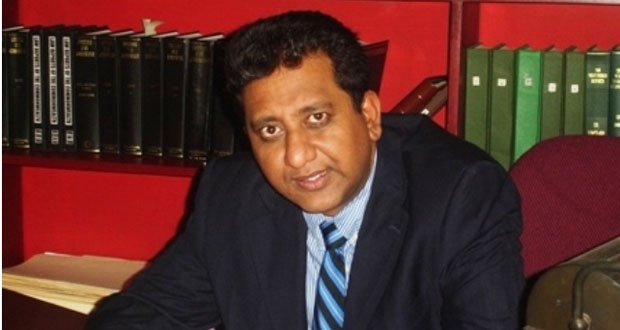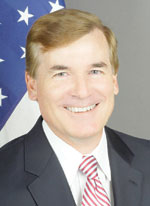
AG, US Ambassador at odds over moves to foster free media
THE Attorney-General (AG) and Minister of Legal Affairs, Anil Nandlall, and the United States Ambassador to Guyana, Brent Hardt, were at odds in their respective opinion of Guyana’s ongoing efforts aimed at fostering a free media.
The two officials were addressing a gathering of journalists, representatives of political parties and Members of Parliament (MPs) at a World Press Freedom Day reception hosted by the US Ambassador at his Cummings Lodge, Georgetown residence on Friday evening.
While the AG made it clear that the “perceived” position of where Guyana stands on the issue of press freedom must be taken in the context of the evolutionary process of the country, Hardt used the findings of the International Press Institute (IPI), which visited Guyana last year end and, together with the Association of Caribbean Media Workers, issued a comprehensive assessment on the media situation in Guyana and in other Caribbean countries.
IPI FINDINGS
Hardt said: “Despite higher rankings in the Caribbean than in Latin America”, they observed, “all is not well for the Caribbean media.
“…turning to Guyana in particular, the IPI focused attention on issues of broadcasting licenses, abuse of state media, the distribution of state advertising, direct intimidation of the press, freedom of information, and media standards.
“…back in May 2012, I expressed my surprise in coming to Guyana and finding that, unlike all other Caribbean countries I had visited, Guyana alone had complete state monopoly of the radio.
“Where, in other countries, the radio, with its ubiquitous call-in shows, was a vital public forum; in Guyana, there was no such counterpart. Two years later, it is certainly disappointing that radio in Guyana still falls short of offering an open public square for debate and discussion.”
“Before we assess today’s state of the press in Guyana, I believe it is incumbent that we reflect on what existed before, before we can make an accurate assessment.”
– Attorney-General and Minister of Legal Affairs, Anil Nandlall
According to Hardt, the IPI Report makes it clear that “attempts to diversify the sector have been consistently stonewalled: a number of independent media outlets have had their broadcast applications denied or ignored, in some cases for more than 20 years.”
The US Ambassador quoted the IPI report, which said: “While IPI was previously aware of allegations that broadcast licenses have been unfairly distributed in Guyana, our visit revealed the full depth and gravity of this issue.
“It is unthinkable that the license applications of certain media have been delayed or ignored for nearly two decades.
“We call upon the newly-constituted Broadcast Authority to immediately undertake a speedy and fair review of any outstanding license applications, and to ensure that all applicants are subject to independent review.”
Hardt also cited the fact that the President of Guyana, HE Donald Ramotar, also holds the portfolio of information minister as well as what the IPI termed “abuse” of the State media and the demeaning of what the Government terms the ‘opposition press’.
He said: “This is indeed a demeaning term (opposition press) that fails to do justice to the vital role that an independent media must play in a modern, democratic society. The use of this appellation is also inaccurate.
“Anyone who reads or watches independent media in Guyana will see that there are letters to the editor supportive of the Government, columns that advocate Government positions and generally balanced reporting on actions of Government.
“By contrast, in the state-owned and state-run media, which should hold itself up to an even higher standard of balance by virtue of its being funded by taxpayers, one hardly ever sees a letter to the editor or a column supportive of the opposition or critical of the Government.
“Such censorship is not only wrong, but completely unnecessary for a Government that is more than capable of defending and articulating its views on a fair playing field of public opinion.” –United States Ambassador to Guyana, Brent Hardt
“In fact, the public reads about instructions being passed by the Government to state-run television, criticizing staff for airing statements by an opposition party directly after the Government’s position was presented, and indicating that such presentations were only to be aired late at night, when viewership was lowest.
“Such censorship is not only wrong, but completely unnecessary for a Government that is more than capable of defending and articulating its views on a fair playing field of public opinion.”
Hardt also noted the IPI reference to state advertising patterns in Guyana, and the equality or non-equality of its distribution and the appointment of the Commissioner of Information, which he stated should be separated from the Office of the President.
Other key issues highlighted by IPI are also essential to a free and independent media and a strong democracy, and they are interrelated: freedom of information and investigative journalism, direct intimidation of the press and training and media standards.
“These are strong words and sound advice from media experts in the Caribbean region,” the US Ambassador stressed.
OUT OF CONTEXT
The AG, in response, made it clear that Guyana has come a far way in terms of press freedom, and is making moves to advance this effort – which is the context in which the subject of press freedom must be viewed.
“There is absolutely no attempt by the Administration, of which I am a part, to influence what those private media houses publish. None at all! There is no attempt to censor any journalist practising his trade or professional pursuit in this country. None at all!”
– Attorney-General and Minister of Legal Affairs, Anil Nandlall
He said, “Before we assess today’s state of the press in Guyana, I believe it is incumbent that we reflect on what existed before before we can make an accurate assessment.
“…not so far in our distant past, we lived in a society where the press was absolutely controlled by the Government of the day. The medium through which information was disseminated was singularly from the Government sources.
“Newsprint was denied to opposition political parties for the publication of their newspapers, and when a legal challenge was launched against that restriction on the importation of newsprint, the highest court of the land ruled that there is no direct impact between newsprint, the importation of which was necessary at the time, that there was no direct impact between newsprint and freedom of the process.
“We come from a history where journalists were beaten, brutalised, jailed, and murdered. I hope persons are paying attention to the Walter Rodney Commission of Inquiry, a lot of important aspects of life in Guyana 30 years ago are unfolding before that Commission.”
According to him, Guyana today has Government newspapers, private newspapers, private media houses operating some 20-odd television stations, Internet-generated news agencies, and the opening of the radio spectrum where eight radio stations are currently operating, only two of which are controlled by the Government.
NO CENSORSHIP
Nandlall said: “There is absolutely no attempt by the Administration, of which I am a part, to influence what those private media houses publish. None at all! There is no attempt to censor any journalist practising his trade or professional pursuit in this country. None at all!
“In fact, what we have in Guyana is press freedom sometimes being abused. One only has to pick up the newspaper and you see the extremity about which I speak.”
Nandlall agreed with the ambassador that there is need to regulate press freedom.
He said, “It is important that Government remains accountable, and every effort is being made to achieve this objective. The press, as an important watchdog, must also, through self-regulation or other mechanism, remain accountable as well.
“…I don’t believe that there is any sector in the country that should operate in a manner that is unaccountable and less than transparent; we are living in a different world.”
US PRESS FREEDOM
The AG flayed the ambassador for his criticisms of press freedom in Guyana, a developing country, given the state of press freedom in the United States of America.
He said, “I didn’t hear the Ambassador speak about press freedom and journalism as it exists in the US.
“The US has its own problems as well. Aljazeera took nearly a decade to get license to broadcast in the United States of America.
“We all have challenges. Many people will tell you that any dispute involving the United States of America, if you want to get an accurate picture of it you don’t look at certain television broadcasts in the US, you look at BBC and other television stations.
“So every country has (its) own peculiar biases and prejudices, and the news is going to be slanted in a particular way.
“Guyana, I suppose, is no different. A lot has been said about the state media; the state media was highlighted. The importance of the public media, rather, was highlighted only last year at UNESCO’s General Assembly meeting.
“The point was made very emphatically that the public media has a very important role to play, because the public media is not driven by profits, which essentially is what drive the private media. The public media targets certain rural communities which otherwise may not have access to the private media because it simply is unprofitable for the private media to operate in those rural communities; and therefore, the public media is the only source of information to those outlying areas.”
Nandlall maintained that Guyana is no different. “We live in a country that is relatively vast in comparison with our population, and therefore the state media has an important role to play,” he said.
The AG cited the role of the National Assembly also in supporting press freedom, and pointed out that he is unaware that any request has been made either from the media or from the political parties in relation to information. He said Government has been supplying information pursuant to the provisions of the act.
Nandlall reiterated that before comments are made about the state of any situation, there must be consideration of what existed before and what obtains in present day.
This year, World Press Freedom Day was observed under the theme ‘Media Freedom for a Better Future’.
(By Vanessa Narine)

